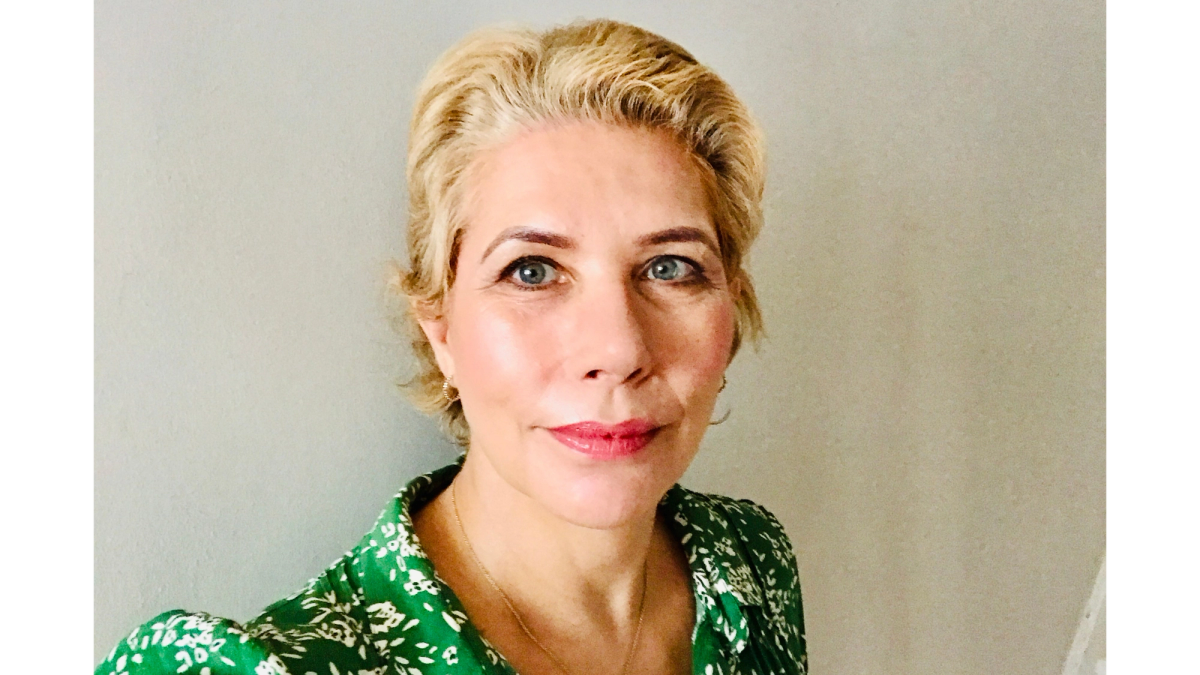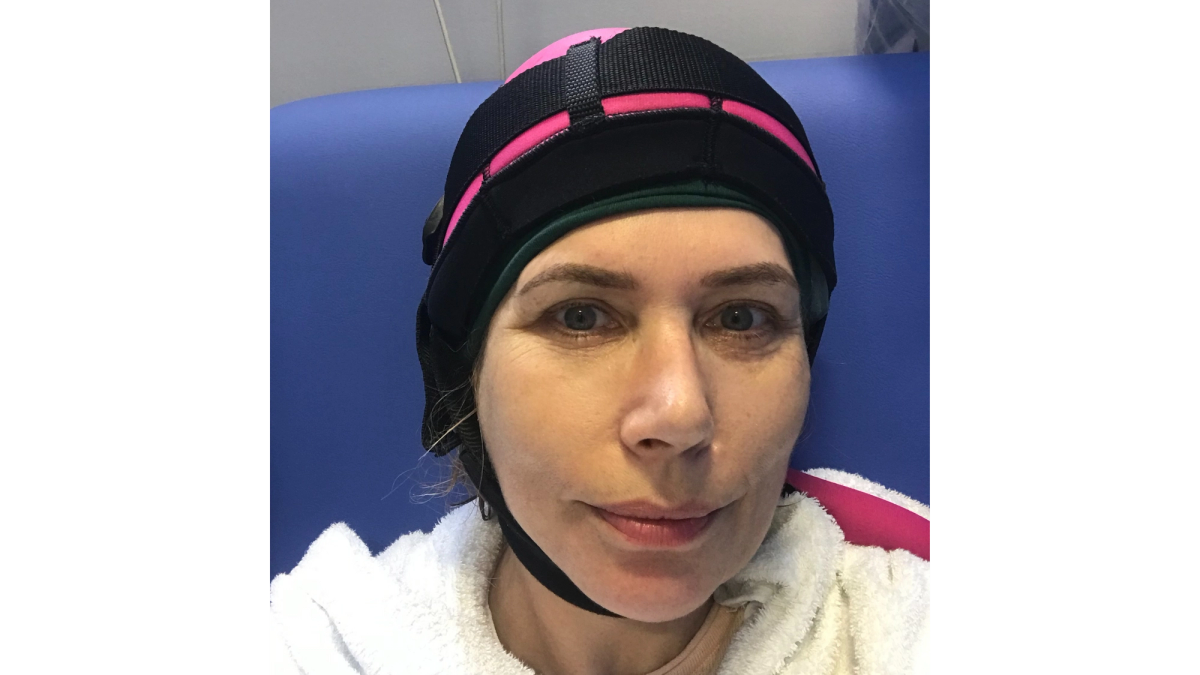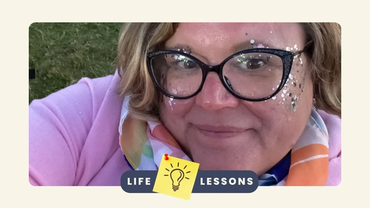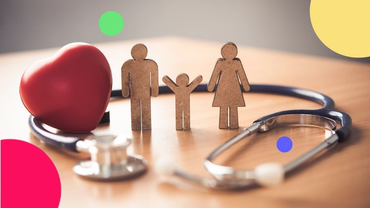2 Sep, 2022
What I Wish I'd Known
'My breast cancer taught me how to feel lucky & be happy'
Last September, Leah Hardy, 59, a London-based writer and mother of two teenagers, was diagnosed with a highly aggressive form of breast cancer. She shares the unexpectedly positive lessons she’s learned from her experience.

Leah Hardy feels breast cancer taught her to live a happier life.
By Leah Hardy
When I was first told I had breast cancer, I thought I would die. I was terrified that I’d leave my husband and two teenage children behind. But my doctors were optimistic, and so far, it seems as though they were right to be.
A mixture of old-school chemotherapy and miraculous modern drugs eliminated every trace of my ferocious cancer before I even got on the operating table. My prospects are, they say, pretty damn good. Cancer has been frightening, yes, and tiring. But I’ve also learned a lot about myself. And it might surprise you to know that in many ways, I’m a better person with a happier life. Here’s why.
Happiness is a decision
Or rather, for me, the result of a lot of small decisions. Like many of us, without realising it, I often allowed life to happen to me. The weekend would arrive, and I had nothing planned. I’d find I’d missed the opportunity to see that film I really fancied. I’d eat certain meals out of habit, without thinking if I really enjoyed them. Life was busy and fine, but I confess, often pretty ‘meh’.
The key to learning what you enjoy – at any age – is to start truly paying attention to your experiences and how they make you feel. Then ditch the blah ones and repeat the wow ones. I started visiting art galleries with my daughter, then aged 16. We discovered Fortnum’s perfume department and the joys of afternoon tea. More recently, I had a yen to see Sissinghurst Garden in Kent in full bloom, so I planned for it.
During treatment, I’d often book a future treat while hooked up to the chemo drip. It might have been an exhibition, dinner, or simply a dog walk and coffee with a friend. Living in the present is great, but anticipation can be even better.
Complaining is a toxic habit
‘Mustn’t grumble’ we’ll say, after releasing a torrent of petty gripes. Until I had cancer, I rarely noticed how much people complain about, well, everything. I’ve even seen people moan about the inconvenience of decorating their second home in the country.
To stave off gloomy or frightening thoughts during my treatment, I started to deliberately count my blessings instead, and I was surprised how many there were. I started prefacing remarks with the phrase, ‘I’m lucky because…’ For example, I am lucky to have received state of the art cancer treatment. I am lucky to have a comfortable bed, a safe home, good friends, and simply to be alive and able to see the sky and flowers.
The more I repeated the phrase, the happier and, yes, the luckier, I felt.

Leah Hardy wearing her cold cap to help protect her hair during chemotherapy treatment.
You learn how much people care
I often tell people that a cancer diagnosis can be a wonderful opportunity to learn just how much people love you. They worry that you might die, which heightens emotions. Sometimes they cry, which could be awkward, but I chose to see it as a manifestation of love. They send you flowers and cards. Take you for lunch and tea. Hug you a bit harder. You can go through most of your life without this outpouring of feeling. How often do people at funerals say, ‘they would be surprised to see how much they were loved’? I feel immensely fortunate to know. So, tell someone you love them today.
Communication is everything
How often do you button up what you really want to say? How often do you fail to ask a question out of fear that you won’t like the answer? Do you ever swallow a disappointment and find yourself brooding on it long after it happened? Do you secretly think that hinting should be enough and then feel sad that you don’t get what you want? Cancer taught me that life was too short for all that. So, I’d be open about what I wanted – be it a particular birthday present, to find out what my kids were thinking or simply for my husband to stop at a beauty spot while we were out driving. I didn’t always get what I wanted, but that was fine too, because I also learned to say no to things I didn’t want. Clear, open, honest communication can feel scary, but it transforms relationships for the better.
Money is for the living
One of my few regrets is that, like many people, I didn’t think about how I’d manage financially if I ever became ill. Partly it was denial. After all, I was perfectly healthy and strong, why would I worry about something that probably wouldn’t happen? I was also unrealistic. I’m a hard worker and I assumed that whatever happened to me, I’d be able to carry on working. Plus, I was confused and cynical about financial services. I didn’t know where to get advice and worried that I’d be sold the wrong product for the sake of an advisor’s commission. But breast cancer affects one in seven women in their lifetime, and I’ve seen gloriously healthy, athletic women in their thirties and forties going through it.
And when it happened to me, I was far too stressed and frankly, far too busy with treatment to work. I am self-employed, which meant I didn’t get sick pay, but even if you have a safe job, you might find your employer is less generous than you might have hoped and cancer treatment can easily take a year. It would have made a big difference to have had insurance that paid out for illness – even if it just replaced my income.
You might think of this kind of planning as morbid or ‘tempting fate’, which is of course, ridiculous. The truth is most of us survive breast cancer and we want holidays, new clothes, meals and with friends and fun, without having worry about cash or raiding the kids’ university funds. As I emerge from treatment, I am rethinking my financial affairs, and my children have got new savings accounts too!


